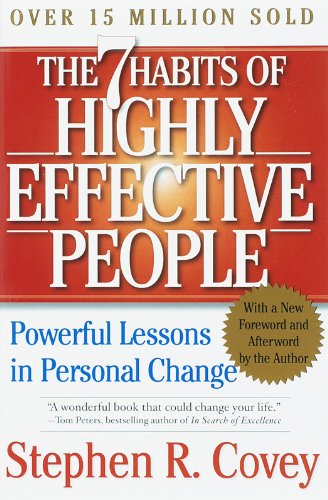The Seven Habits of Highly Effective People by Stephen Covey

The world of management and self-help literature is awash with quick fixes and superficial tricks. In reality, true excellence can only come from strong character, robust principles, and consistent habits. There are no shortcuts and no overnight successes. Private victory always comes before public victory and mastery of the self always comes before mastery of interpersonal relationships.
Habit 1: Be Proactive. Effective people act on the world rather than allow the world to act on them. They direct their efforts on the things they can influence rather than fret about the things that are outside their control. Proactive people understand that while they do not choose their circumstances, they can always choose their response to their circumstances.
Habit 2: Begin with the End in Mind. When asked about their life priorities, people often answer with concrete elements of their lives such as their family or career. In contrast, effective people have a clear idea of the sort of person they want to be and are driven by a set of values that is independent of their situation. By being value-driven, effective people develop a stable sense of self that is resilient to shocks from the outside world. Effective people know what their guiding principles are and they design their lifestyles to be in harmony with their principles.
Habit 3: Put First Things First. People usually spend too much time on things that are urgent but not important while neglecting activities that are important but not urgent. Effective people prepare their schedules in a priority-centric manner rather than a time-centric manner, taking care not to neglect long-term concerns. By quickly and proactively dealing with large long-term problems, effective people can prevent many high-importance-high-urgency crises from developing in the first place.
Habit 4: Think Win/Win. People often think of negotiation as either win/lose (win at the expense of the relationship), lose/win (capitulate to save a relationship), or compromise (somewhere in between). Effective people seek agreements that mutually benefit both parties while also adding more trust to the relationship between them. When proposing agreements, effective people focus on clearly articulating shared goals, expectations, and success criteria in a relationship. When agreements are win/win and a trusting relationship is established, people will comply with agreements voluntarily out of intrinsic motivation, with no need for authoritarian supervision or coercion.
Habit 5: Seek First to Understand, Then to be Understood. People tend to listen to others passively, more concerned with preparing their response than with understanding what the other person is saying. Lots of interpersonal interactions go off track because of people shoving their autobiographies down other people’s throats. By making the effort to learn other people’s desires rather than blindly assuming or projecting them, effective people are better able to resolve conflicts, build trust, and avoid stressful misunderstandings.
Habit 6: Synergize. Effective people try to set up team environments with a clear mission, high psychological safety, high shared trust, and few perverse incentives. Once these conditions are established, a multiplier effect is created and a group becomes much more productive than the sum of its parts.
Habit 7: Sharpen the Saw. A balance between short-term production and long-term production capability must be maintained. It is unsustainable and unproductive to operate at full throttle all the time. Effective people take care to set aside time to maintain their health, to self-reflect, to learn, and to re-energize.
